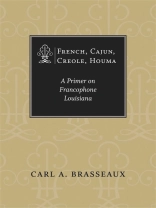In recent years, ethnographers have recognized south Louisiana as home to perhaps the most complex rural society in North America. More than a dozen French-speaking immigrant groups have been identified there, Cajuns and white Creoles being the most famous. In this guide to the amazing social, cultural, and linguistic variation within Louisiana’s French-speaking region, Carl A. Brasseaux presents an overview of the origins and evolution of all the Francophone communities.
Brasseaux examines the impact of French immigration on Louisiana over the past three centuries. He shows how this once-undesirable outpost of the French empire became colonized by individuals ranging from criminals to entrepreneurs who went on to form a multifaceted society — one that, unlike other American melting pots, rests upon a French cultural foundation.
A prolific author and expert on the region, Brasseaux offers readers an entertaining history of how these diverse peoples created south Louisiana’s famous vibrant culture, interacting with African Americans, Spaniards, and Protestant Anglos and encountering influences from southern plantation life and the Caribbean. He explores in detail three still cohesive components in the Francophone melting pot, each one famous for having retained a distinct identity: the Creole communities, both black and white; the Cajun people; and the state’s largest concentration of French speakers — the Houma tribe.
A product of thirty years’ research, French, Cajun, Creole, Houma provides a reliable and understandable guide to the ethnic roots of a region long popular as an international tourist attraction.
Circa l’autore
Carl A. Brasseaux is of Acadian/Cajun ancestry and was raised in a bilingual home in the heart of Louisiana’s French-speaking region. The author of more than thirty books, he is a professor of history and the director of the Center for Louisiana Studies at the University of Louisiana at Lafayette.












